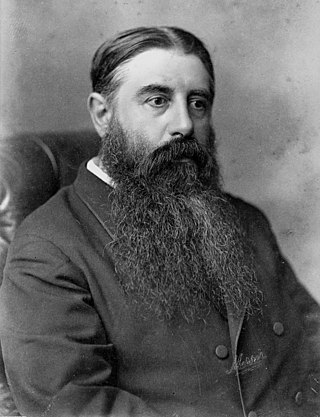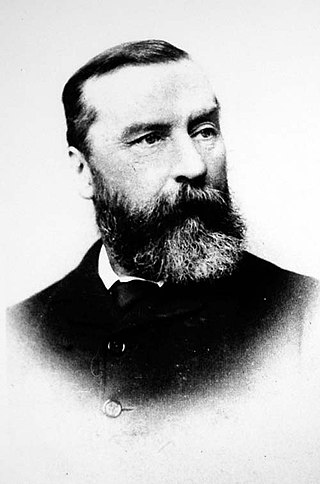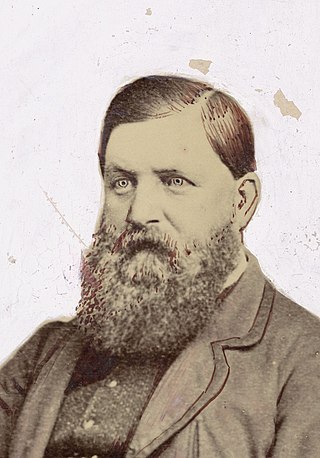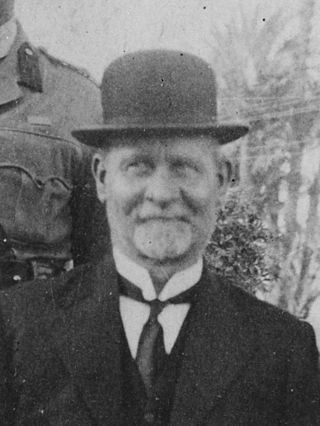
William Sefton Moorhouse was a British-born New Zealand politician. He was the second Superintendent of Canterbury Province.
The 2nd New Zealand Parliament was a term of the Parliament of New Zealand. It opened on 15 April 1856, following New Zealand's 1855 election. It was dissolved on 5 November 1860 in preparation for 1860–61 election. The 2nd Parliament was the first under which New Zealand had responsible government, meaning that unlike previously, the Cabinet was chosen by Parliament rather than by the Governor-General of New Zealand.

The 1875–1876 New Zealand general election was held between 20 December 1875 and 29 January 1876 to elect a total of 88 MPs in 73 electorates to the 6th session of the New Zealand Parliament. The Māori vote was held on 4 and 15 January 1876. A total of 56,471 voters were registered.
Ashley was a New Zealand electorate situated north of Christchurch. It was in use from 1866 to 1902, and was replaced with the Hurunui electorate.

William Reeves was a New Zealand 19th century journalist and politician. He was the father of the author and politician the Hon. William Pember Reeves.

William Henry Eyes was a British-born, New Zealand politician who was the fifth Superintendent of the Marlborough Province, and who represented the Wairau electorate in the New Zealand House of Representatives for many years. Born in England, Eyes had emigrated to Australia in 1839. He was jailed at Parramatta Gaol for a year before he was pardoned, after which he immediately emigrated to New Zealand.

Arthur Penrose Seymour was a 19th-century New Zealand politician from Picton. He was the 4th Superintendent of the Marlborough Province and was a member of the provincial government for all 16 years of its existence. With his strong advocacy for Picton, he successfully had the Seat of Government moved to Picton. When the Blenheim party secured a majority in the Provincial Council by 1865, Seymour negotiated the removal of the Seat of Government back to Blenheim.

Charles Houghton Mills was a member of parliament for Waimea and Wairau, in the South Island of New Zealand.
Wairau was a parliamentary electorate in the Marlborough Region of New Zealand. It was one of the initial 24 New Zealand electorates and existed from 1853 until its abolition in 1938, when it was succeeded by the Marlborough electorate. The electorate had 13 representatives during its existence. The 1861 election in the Wairau electorate was notable in that a later Premier, Frederick Weld, was unexpectedly and narrowly defeated by William Henry Eyes.
The 4th New Zealand Parliament was a term of the Parliament of New Zealand.
James Balfour Wemyss was a 19th-century member of Parliament for Nelson, New Zealand.

Joseph Ward was a 19th-century Member of Parliament from Marlborough, New Zealand.

Henry Dodson was a brewer and a 19th-century Member of Parliament from Marlborough, New Zealand.
James Dupré Lance was a 19th-century Member of Parliament from Canterbury, New Zealand.
William Henry Harrison was a 19th-century journalist from Greymouth who represented two Westland electorates in the New Zealand House of Representatives.
The 6th New Zealand Parliament was a term of the Parliament of New Zealand.

The mayor of Blenheim officiated over the borough of Blenheim, New Zealand. The office was created in 1869 when Blenheim became a borough, and ceased with the 1989 local government reforms, when Blenheim Borough was amalgamated with Picton Borough and Marlborough County Council to form Marlborough District. There were 31 mayors of Blenheim. The last mayor of Blenheim, Leo McKendry, was elected as the first mayor of Marlborough.

Thomas Carter was the third Superintendent of Marlborough Province. Together with two of his brothers, he was a large runholder.

The Wairau by-election 1872 was a by-election held in the Wairau electorate during the 5th New Zealand Parliament, on 19 February 1872. The by-election was caused by the resignation of incumbent MP William Henry Eyes and was won by Arthur Seymour, who defeated Joseph Ward. Both candidates were prominent Marlborough politicians, and for both of them, this was their first attempt at election to the General Assembly.

The 1853 New Zealand provincial elections were the first elections in New Zealand to elect members and superintendents to the newly created Provinces of New Zealand. The elections were held between July and September 1853, at the same time as the 1853 New Zealand general elections for the central government, which were held between July and October. The provincial elections had higher voter turnouts than the general elections, with the elections for provincial superintendents having the highest voter turnout.












